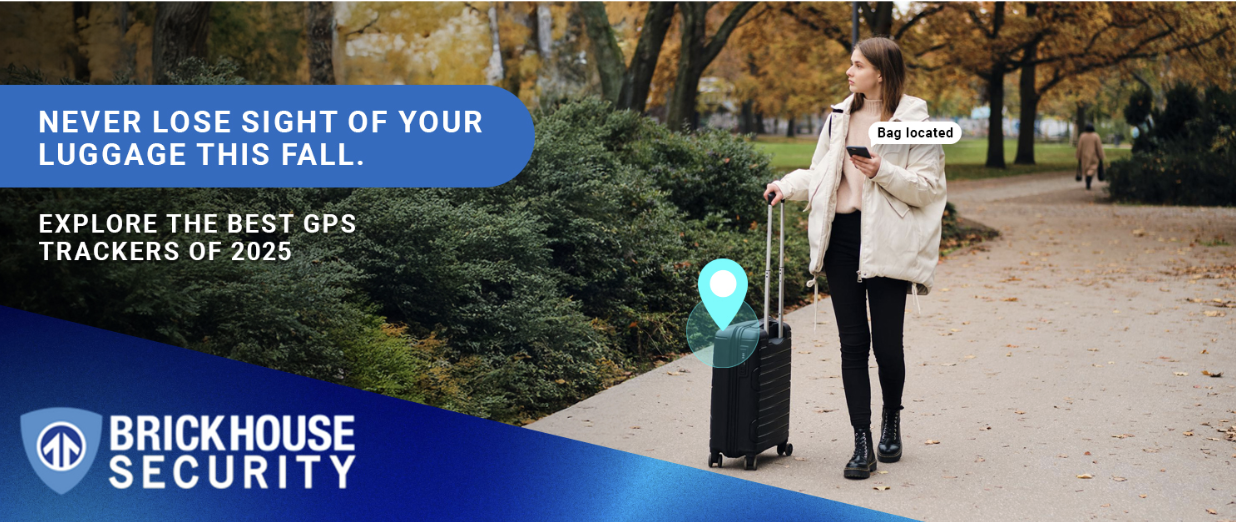Don’t Lose Sight of Your Stuff: Why a GPS Tracker for Luggage is the Smartest Travel Upgrade of the Year

Whether you’re a seasoned globe-trotter or just trying to make it through a hectic family vacation, few things ruin a trip faster than lost luggage. We’ve all seen the viral stories, bags taking off to Tokyo while the owner’s stuck in Tampa. The good news? GPS tracking has become smarter, smaller, and more affordable than ever. And in my view, adding a GPS tracker to your luggage is one of the smartest moves any traveler can make.
At BrickHouse Security, we’ve spent nearly two decades helping people protect what matters most, from vehicles to valuables. And yes, that includes carry-ons, checked bags, and even ski equipment. Here’s what you need to know about using a GPS tracker for your luggage, and how to choose the right one for your needs.
Why Use a GPS Tracker for Luggage?
1. Airlines Lose Luggage, More Than You Think
Even with modern scanning systems, U.S. airlines mishandle over 1 million bags a year, according to the Department of Transportation. Sometimes it’s a delay, other times your bag takes an international solo trip. With a GPS tracker, you know where your bag actually is, not where the airline thinks it is.
2. Peace of Mind While You Travel
There’s nothing like landing in a foreign country and wondering if your bag made it. A GPS tracker gives you live location updates, often right on your smartphone. Whether you’re switching terminals or dealing with tight connections, you stay in control.
3. Faster Recovery If Lost or Stolen
If your bag is misplaced or swiped off the carousel (it happens!), GPS tracking helps authorities or airport staff pinpoint its exact location, fast. That can mean the difference between getting your things back or filing a painful insurance claim.
How GPS Luggage Trackers Work
Think of a GPS tracker like a smartphone without the screen. It uses GPS satellites to determine its location, then transmits that info via cellular or Bluetooth. Some advanced trackers even work internationally, switching networks automatically so you’re covered no matter where you fly.
There are two main types:
Real-Time GPS Trackers
These send live location data to your phone. They require a small monthly data plan, but the trade-off is instant updates and broad coverage, ideal for international travel and checked luggage.
Bluetooth Trackers
Great for carry-ons or short-range tracking. These ping your phone when nearby, but don’t offer true GPS. They rely on proximity, so once your bag is out of Bluetooth range, you’re flying blind.
What to Look For in a Luggage GPS Tracker
As someone who’s tested more trackers than most people test phone cases, here’s what I recommend:
–Long Battery Life: Look for at least 1 week of battery life on a single charge, especially for international trips.
–Global Coverage: Make sure your GPS tracker supports international roaming and multiple networks, especially if you’re heading overseas.
–Easy-to-Use App: The app should let you check your bag’s location at a glance—no digging through menus.
–Geofencing Alerts: This lets you set virtual “fences” around airports or hotels. If your luggage moves unexpectedly, you’ll get an alert.
–Airline Compliance: Trackers should be FAA-compliant for use in checked luggage. Many now use low-power “flight mode” to meet airline rules.
My Top Pick: The Spark Nano 7 GPS Tracker
I personally test every product we sell at BrickHouse Security, and for luggage tracking, the Spark Nano 7 is my go-to. It’s:

- Compact and lightweight (fits in a shoe or toiletry bag)
- Offers real-time tracking with 4G LTE coverage in over 140 countries
- Features geofencing, location history, and mobile alerts
- Has a battery life of up to 15 days with an extended battery option
Just charge it, place it in your suitcase, and track it from anywhere. And because it’s small and discrete, it won’t raise red flags with security or other travelers.
Pro Travel Tips for Using a GPS Tracker in Your Luggage
- Label the Tracker: Write your contact info on the tracker in case it’s removed during screening.
- Test Before You Fly: Check battery and app functionality before leaving home.
- Charge It Fully: Don’t count on charging options at the airport—power up in advance.
- Use a Waterproof Case: In case of rain, spills, or checked bag handling mishaps.
Final Thoughts: A Small Investment for Big Peace of Mind
Travel is supposed to be exciting, not anxiety-inducing. A GPS luggage tracker can’t stop delays or lost bags, but it gives you real answers when the airline says, “We’re not sure where it is.”
I created BrickHouse Security because I believe people deserve simple, reliable tools to protect what matters most. For frequent flyers, family travelers, and digital nomads alike, a GPS tracker in your luggage is a no-brainer. It’s one less thing to worry about, so you can focus on the journey.
Safe travels,
Todd Morris
Founder & CEO, BrickHouse Security
www.brickhousesecurity.com





